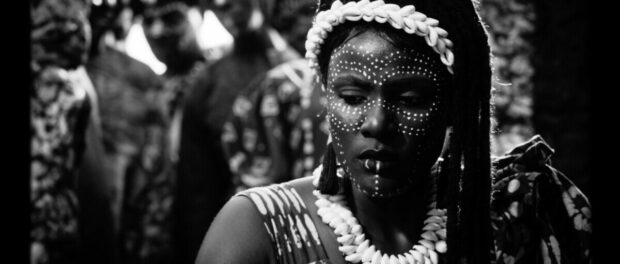Fantasia Reviews: Mami Wata
Mami Wata is shot almost entirely in black and white, and that, along with some of the choppy editing, creates the feeling that this isn’t a film made today, but of a older generation, especially reminiscent of Akira Kurosawa. Similarly, the story feels as if it comes from another time, a slow moving heroic journey from acolyte to spiritual leader. In this case, though, the hero is not the typical single male, but two sisters Prisca and Zinwe who were adopted by the African coastal, rural village of Iyi’s spiritual leader, Mama Efe (Rita Edochi). Mama Efe serves as the intermediary to Mami Wata, a water goddess who is worshipped in West, Central, and Southern Africa, and the goddess provides Iyi with blessings, healings, and presumably peace. For her services, Mama Efe collects a portion of each villager’s harvest. However, some of the villagers are losing faith in Mami Wata and question if hospitals, lights, roads, and schools would be better than their traditional ways. While Mama Efe remains steadfast, her two daughters are less convinced in the power of Mami Wata. The outspoken and doubting Zinwe (Uzoamaka Aniunoh) runs away even though she is fingered to be the next intermediary, while Prisca (Evelyn Ily Juhen) pursues relationships with local men and rides around on a motorcycle.
After Zinwe runs off, the village’s stability is further threatened with Mama Efe and Prisca take in Jasper, a deserter rebel from another village. Jasper introduces disharmony to the village and takes advantage of the power imbalances and doubt to turn himself into the village big man. Along with the patriarchal rule, guns and violence arrive, and the fickle/impotent villagers need Mami Wata more than ever.
One feature of the film that stands out for me is the choice to use a pidgin English as the language of the village, with subtitles. This gives the entire narrative that sense of familiarity and otherworldliness that is the characteristic of timeless fables.
Many have praised Lilis Soares’ cinematography, as he developed a special technique to showcase black skin. I’m not sure if I am entirely convinced that black and white was the best choice, as I sometimes had to work hard to keep track of which characters were in a scene. But, contrasting dark hair and faces against white shells and face paint makes for arresting visuals and many others have admired how he captures the ocean at night. There are certainly beautiful moments, such as the scene where the sisters and villagers play-wrestle on the beach or close ups of faces with their elaborate face paint and expressive eyes.
Mami Wata is a touch slow but it also brings the viewer to a time and place without smartphones and UBER, but with gods and human connection.
Mami Wata played as part of the Fantasia Festival. The Festival continues until August 9. Details HERE.






